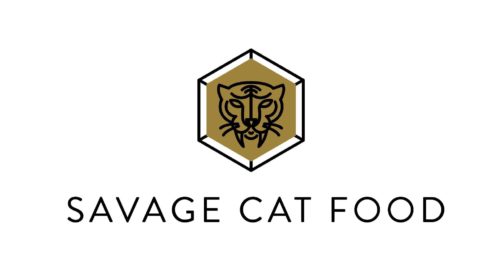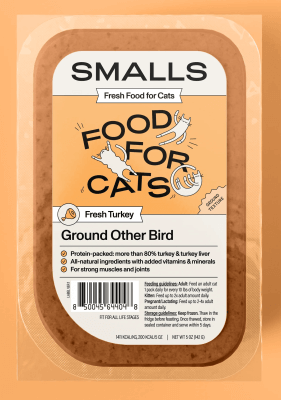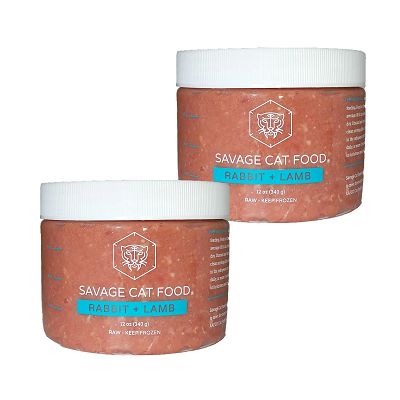Best Cat Food For Hyperthyroidism (original) (raw)

Kirsten McCarthy / Cats.com
Prescription cat food for hyperthyroidism features deliberately low levels of iodine to help reduce the production of excess thyroid hormone. While dietary therapy won’t cure hyperthyroidism in cats, it may help your cat maintain or regain muscle mass and support their recovery with proper treatment.
Because it’s specifically formulated for low levels of iodine, many veterinarians recommend Hill’s Prescription Diet y/d Thyroid Care cat food. This food is formulated to contain 0.1 ppm of iodine (measured as dry matter) and is clinically proven to decrease thyroid hormone production.
Hill’s also offers a dry cat food version of the formula, but feeding your cat a moisture-deprived diet may contribute to other health problems. As an alternative, we’ve assembled a list of species-appropriate wet cat foods with lower-than-average iodine levels.
NOTE: The foods on this list are non-prescription products that are not specifically formulated for the dietary management of hyperthyroidism. Your veterinarian is the best person to recommend treatment options for hyperthyroidism in cats.
At A Glance: Best Cat Food For Hyperthyroidism To Buy
Want a quick look at the products reviewed in this article? In the comparison table below, we’ve highlighted some of the most important features of each product. You’ll find more detailed information about each product later in the article.
Best For Picky Eaters

9.5
Picked by 25 people today!
Smalls Ground Other Bird Fresh Cat Food
- Made with a single source of animal protein
- High in protein with low carbohydrate content
- Rich source of hydrating moisture
GET 35% OFF ENTER "CATS35" TO GET 35% OFF YOUR FIRST ORDER
Best Noval Protein

9.4
Picked by 31 people today!
Savage Cat Food Rabbit & Lamb Frozen Cat Food
- Species-appropriate blend of muscle meat, organs, and bone
- Rich in moisture to support your cat’s hydration
- Very low carbohydrate content, under 10%
Why Trust Cats.com
Our recommendations result from many hours of research by multiple team members, including our panel of veterinary advisors. In addition to researching the subject of dietary management for hyperthyroidism in cats, we evaluated dozens of prescription and non-prescription products, comparing their iodine content to the AAFCO minimum recommendation of 0.60mg/kg (measured as dry matter).
Along with one popular prescription thyroid care product, we included biologically appropriate cat foods that test under 3.0mg/kg of iodine, measured as dry matter. All foods were purchased at full retail price and tested in-house by members of our team with their own cats.
Our testing process involves detailed brand research, in-depth analysis of the product’s nutritional information, and evaluation of the product’s appearance, aroma, texture, consistency, and packaging. We rely on our cats’ responses to the food to gauge its flavor and general appeal.
How We Made Our Selections
We spent hours researching the subject of dietary management for hyperthyroidism and evaluating both prescription and non-prescription cat foods.
Using the requirements listed above, we gathered nutritional information for products from over twenty of our highest-rated brands. When typical nutrient analyses weren’t readily available, we contacted the brands directly. Some were more forthcoming than others.
Using dry matter values, we narrowed our list down to seven products with the lowest iodine levels. We eliminated fish-based foods and foods that contain seaweed-based ingredients like kelp, dulse, and agar-agar.
NOTE: The foods on our list are not formulated for thyroid care, so they are much higher in iodine than a prescription diet would be. We selected foods that tested as close to 0.60mg/kg iodine (measured as dry matter) as possible — the AAFCO minimum recommendation. The foods on this list tested under 3.0mg/kg, measured as dry matter.
The Top 7 Best Cat Foods For Hyperthyroidism
What To Look For in the Best Cat Food for Hyperthyroidism?
Hyperthyroid Cats Need Highly-Digestible Protein.
Hyperthyroid cats have two things working against them when it comes to maintaining muscle mass. First, they have an overactive metabolism. Secondly, most of them are seniors.
New research suggests that seniors have high protein and energy needs—similar to the needs of kittens. When these needs aren’t met, they lose muscle.
Choose foods with over 50% of calories from protein. The best protein sources are species-appropriate and highly digestible. As an obligate carnivore, your cat requires meat-based food with no high-protein fillers like pea protein, potato protein, wheat gluten, and corn gluten meal.
Choose a Diet That’s Less Than 10% Carbohydrate on a Dry Matter Basis.
Hyperthyroidism raises your cat’s blood glucose levels and often leads to insulin resistance and impaired glucose tolerance. This is a prediabetic state. Even if this doesn’t advance to full diabetes mellitus, hyperthyroid cats are sensitive to sugar and require controlled levels of dietary carbohydrates.
What To Avoid When Feeding a Hyperthyroid Cat?
Avoid Fish-Based Foods.
A study in 2000 found that cats who preferred canned cat food in fish or liver and giblets flavors had an increased risk of hyperthyroidism. Fish and other ocean creatures have higher levels of iodine than are found in other foods. Since iodine is central to thyroid function, this may be part of the connection, but it’s not clear that iodine content is the only problem. Talk with your veterinarian if you are concerned that your cat’s canned food diet is increasing the risk of hyperthyroidism.
Most Fish Is Contaminated With Toxins, Including PBDEs
These fire-retardant chemicals were extremely popular in the late 1970s and were used to treat everything from pajamas to curtains. Because they’re known endocrine disruptors, PBDEs were essentially phased out in the United States and European Union during the early 2000s. That doesn’t mean they’re not still everywhere. These toxins linger in soil, dust, waterways, human bodies, and the ocean — they’re present in cans of fish-based food.
According to a study published in 2017, PBDE levels in the blood were higher in hyperthyroid cats than in healthy cats. This study also noted that PBDEs disrupt thyroid function and may contribute to hyperthyroidism in cats.
If Feeding Canned Food, Ensure That The Can Is BPA-Free.
Cats who eat canned foods, particularly cans with pop-top lids, have an increased risk of thyroid problems. Cat food cans are often coated with an epoxy lining containing BPA. BPA acts as a thyroid receptor antagonist and alters thyroid function.
Don’t Feed Your Cat Soy
Soy disrupts normal thyroid functioning. A soy-containing diet may increase a cat’s risk of developing hyperthyroidism.
When researchers gave 18 healthy adult cats either a soy or soy-free diet for three months, they found that the cats who ate a soy diet ended the study with “significantly higher total thyroxine (T4) and free T4 (fT4) concentrations, but unchanged total triiodothyronine (T3) concentrations.”
The soy-based diet had a small, but significant effect on the amount of thyroid hormone produced by the body.
Select A Low-Iodine Diet
Iodine plays a role in thyroid hormone production. Therefore, a cat with hyperthyroidism should eat a low-iodine diet to ensure that the overactive thyroid glands aren’t being stimulated to produce even more thyroid hormone.
Should You Feed Your Cat a Prescription Diet for Hyperthyroidism?
A low-iodine diet cuts off the supply of iodine, slowing thyroid hormone synthesis. It does not fix an enlarged thyroid gland, nor does it prevent an adenoma from changing into a carcinoma. It only reduces the symptoms of hyperthyroidism.
Because prescription options are limited (or frequently sold out online), it may be more practical to feed your cat a high-protein, fish-free wet cat food with low carbohydrate content to help manage symptoms.
How Much Iodine Does a Normal Cat Require?
Given the diversity of iodine concentration in homemade, commercially-available, and wild-caught food, it’s difficult to identify how much iodine cats require.
In 2006, the National Research Council suggested that the dietary iodine requirement for cats was 1.3 ppm. Newer research conducted by Hill’s Pet Nutrition suggests that the requirement may actually be closer to 0.46 ppm.
Therapeutic diets designed around low iodine levels are limited and Hill’s is the only brand to offer a prescription product for hyperthyroidism.
Hill’s thyroid care wet cat food contains about 0.1 ppm iodine, which is very low. If you choose this diet for your cat, keep in mind that, while it’s currently thought that iodine is used only for thyroid hormone synthesis, we ultimately don’t know how an iodine-restricted diet will affect long-term health.
Because it’s restrictive, not species-appropriate, and isn’t a real cure, think of this diet as a temporary measure or as a last resort for cats who can’t undergo surgery or receive radioiodine therapy.

